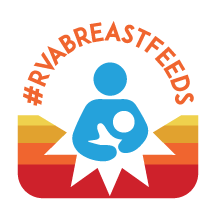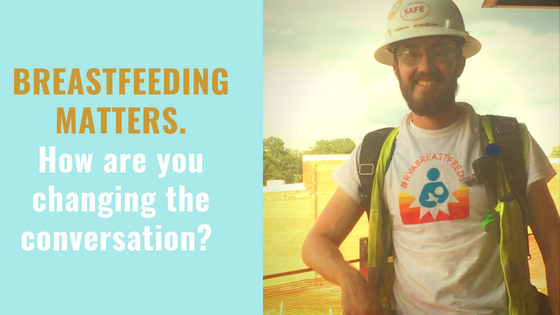Breastfeeding Matters. How are you changing the conversation?
/Breastfeeding is big news lately. On July 9, the New York Times released a story describing the US delegation’s bullying of other nations at the World Health Alliance’s meeting to approve a recommendation to support, protect, and promote breastfeeding. That piece spawned multiple other articles that examined the US stance on breastfeeding.
On July 12, here in Richmond, a security officer at the Richmond International Airport, responding to a complaint about a breastfeeding mother, told her that feeding her baby was indecent exposure, and that she needed to move or cover up. Knowing her rights, the mother reported the incident on RIC’s Facebook Page. RIC publicly apologized within 24 hours and made a commitment to educate their staff so that an incident like this would not happen again. It was a stellar institutional response to misinformed and inappropriate behavior. The incident was covered by multiple news outlets. You can see that coverage hereand hereand here.
Two days later, prompted by the news coverage of the airport incident, a local mother reached out to us privately on our Facebook Page with these words (shared with permission):
“I had a horrible experience at my boy’s school this past year. I was breastfeeding my baby while having lunch with my son and the principal came over and not only said I couldn't breastfeed but caused a scene and shamed me in front of the other students saying it was inappropriate and she could not allow it . . I felt violated and it makes me sick every time I see her. I was hoping for some advice on what I should do once summer break is over and I have to face her again . . . “
Later that morning by phone, she recounted in great detail the negative impact this incident had had on her. Virginia law protects the right of breastfeeding parents to breastfeed wherever they are lawfully present. At the time of the confrontation, knowing that she had the law on her side, she had pursued proper channels of authority to address the administrator’ conduct. Unfortunately, unlike the airport’s prompt apology and commitment to do better, the administrator’s response was to continue to insist that, regardless of the law, she was justified in her actions.
This particular story has a number of disturbing elements: a violation of state law on school property, public shaming of a breastfeeding parent in front of children by an authority figure, followed by a failure on the part of the school system to properly address the situation and take action to prevent a recurrence. The lack of organizational accountability further intimidated this mother. “If this had happened in a public setting like the airport or a restaurant, I would have gone public just like the mother in the airport. But my children attend this school, and I’m afraid of retribution. I just wanted to protect my kids.”
She also wanted to prevent similar situations from occurring for other breastfeeding parents, which is why is sharing her story now. “I don’t want a drama about my school. That’s not going to help. I want to have an impact without names being thrown out there.” For both of these reasons, she is sharing her story anonymously.
You can read her full story here.
Not breastfeeding has a huge impact on the short and long term health of mothers and babies. Breastfed babies have lower risks of asthma, obesity, ear infections, lower respiratory infections, diarrhea, and Sudden Infant Death Syndrome. Parents who breastfeed have a lowered risk of breast and ovarian cancer, heart disease, and diabetes. Studies indicate we could save $13 billion dollars in child health costs and $17 billion in maternal health costs annually if 90% of mothers could breastfeed according to current recommendations (6 months of exclusive breastfeeding followed by continued breastfeeding to at least one year or as long as desired by mother and baby).
Breastfeeding rates have been increasing in the US. Yet 60% of mothers do not breastfeed for as long as they intend to. The Surgeon General’s Call to Action to Support Breastfeeding cites public stigma as a major barrier to breastfeeding. Although a 2015 Virginia law was passed protects parents’ right to breastfeed in public, it is clear from incidents like the two cited in this post that not every organization has gotten the message.
No one breastfeeds alone. This week we challenge you to help change the conversation. Share the information and stories we’ll be posting this week and throughout National Breastfeeding Month. Ask your friends and family what they know about breastfeeding. Find out what the lactation policies are at your place of employment, at your children’s childcare facility or school. If you’re a local business or public venue, request one of our free “Breastfeeding Welcome Here” stickers so breastfeeding parents know they are welcome in your facility.
As we launch World Breastfeeding Week 2018, may we come together to share stories of breastfeeding challenges and triumphs, so that we build a community that truly supports what is best for our children and our families.
Leslie Lytle,
Executive Director, Nurture
Coordinator, #RVAbreastfeeds Healthy Communities Action Team
Virginia Public Breastfeeding Law:
Enacted in 2015, Va. Code § 32.1-370 states, “A mother may breastfeed in any place where the mother is lawfully present…”
The Virginia Department of Health is charged with addressing violations of the state breastfeeding law. If you have a question or concern about this law or feel your rights have been violated please email vabreastfeeds@vdh.virginia.gov or visit their Breastfeeding page.
Community Guidelines:
Our goal is to promote a breastfeeding friendly community. You are encouraged to share your thoughts as they relate to the topic being discussed. We expect comments generally to be courteous. To that end, comments are reviewed according to the following guidelines. We reserve the discretion to remove comments that:
- Contain personal attacks or insulting statements directed toward an individual;
- Contain threats or defamatory statements;
- Contain hate speech directed at race, color, sex, sexual orientation, national origin, ethnicity, age, religion, or disability;
- Promote or endorse services or products;
- Are unrelated to the topic being discussed;
- Are of a repetitive or “spamming” nature (the same comment posted multiple times).


